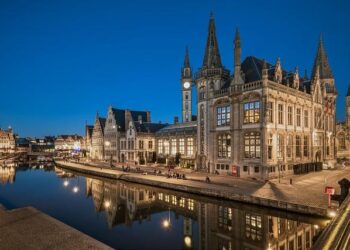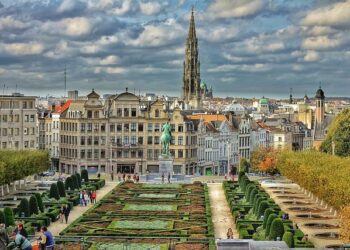Tens of thousands of protesters gathered in central Brussels this weekend to demonstrate against Israeli policies, marking one of the largest anti-Israel rallies in the Belgian capital in recent years. The march, which drew a diverse crowd from various communities, highlighted growing tensions surrounding the Israeli-Palestinian conflict and sparked a significant security response from local authorities. Organizers called for an end to what they described as ongoing injustices, while onlookers expressed concern about escalating regional violence. This event underscores the continuing global resonance of the conflict and its capacity to mobilize public opinion far beyond the Middle East.
Massive Turnout Reflects Growing Public Dissent in Belgium
In a striking demonstration of collective unrest, tens of thousands gathered in central Brussels, signaling an unmistakable surge in public opposition toward the ongoing conflict involving Israel. The streets teemed with protesters of diverse backgrounds, unified in their demand for peace and justice. Organizers reported one of the largest mobilizations in recent years, highlighting deep-seated frustrations that go beyond local issues and resonate with global geopolitical concerns.
The demonstration was marked by a series of coordinated activities that captured both the fervor and the seriousness of the crowd’s message. Notably, participants emphasized key demands that have rapidly gained traction:
- Ceasefire initiatives advocated through loudspeakers and banners
- Humanitarian aid for affected civilians in conflict zones
- Political accountability from international actors
- Dialogue and diplomacy over military action
| Key Details | Information |
|---|---|
| Estimated Attendance | 40,000+ |
| Location | Central Brussels, near Place de la Bourse |
| Duration | 5 hours |
| Police Presence | Moderate, with peaceful engagement |
The atmosphere remained largely peaceful despite the overwhelming numbers, with organizers and law enforcement working jointly to manage crowds and ensure safety. The event’s scale and intensity underscore a shifting public mood, amplifying calls for a reassessment of policies related to the Israel-Palestine conflict.
Security Challenges and Police Response During Central Brussels Protest
The large turnout for the demonstration presented a complex security environment for law enforcement agencies. Authorities faced significant challenges in managing crowd control while balancing the right to peaceful assembly with public safety concerns. Police forces deployed a combination of visible patrols, barricades, and surveillance technology to monitor the movements of protestors and quickly identify potential flashpoints. Coordination among multiple units, including riot police and plainclothes officers, was crucial to maintaining order in the densely packed city center.
Despite the scale of the protest, reports indicated that the overall situation remained largely peaceful, thanks in part to proactive communication strategies and rapid response protocols. However, isolated incidents involving minor scuffles and property damage prompted targeted interventions. The table below summarizes key security measures implemented during the event:
| Security Measure | Description | Outcome |
|---|---|---|
| Visible Police Presence | Strategic deployment of uniformed officers across main gathering points | Deterred large-scale violence |
| Surveillance Cameras | Real-time monitoring via CCTV and drones | Enhanced situational awareness |
| Rapid Response Teams | Special units ready to intervene in unrest | Quick containment of isolated disturbances |
| Community Liaison Officers | Facilitated communication between protest leaders and police | Reduced misunderstandings and tensions |
- Traffic restrictions were enforced to ensure safe routes for emergency vehicles and to prevent gridlock.
- Information dissemination through social media channels helped keep attendees informed of safe zones and regulations.
- Legal observers monitored police conduct to ensure compliance with protocols and human rights standards.
Community Leaders Urge Peaceful Dialogue Amid Rising Tensions
In the wake of a massive demonstration that drew tens of thousands to the heart of Brussels, community leaders across the city have come forward to emphasize the critical need for peaceful dialogue and understanding. Recognizing the heightened emotions surrounding the ongoing conflict, representatives from various religious and civic groups underscored the importance of civility to prevent further polarization. They cautioned against inflammatory rhetoric and urged all participants and observers to respect the rights and safety of all citizens, regardless of background or belief.
To foster a constructive environment moving forward, the leaders outlined several key principles:
- Commitment to non-violence: Rejecting any form of aggression or hate speech.
- Open communication channels: Encouraging dialogues that engage diverse community voices.
- Collaboration with authorities: Working with law enforcement to ensure peaceful assemblies.
- Promoting empathy: Understanding the complex narratives behind the tensions.
| Organization | Statement Highlights | Next Steps |
|---|---|---|
| Interfaith Council | Calling for unity and tolerance | Monthly community forums |
| Civic Alliance | Condemned violence, urged peaceful protests | Partner with police for safe demonstrations |
| Youth Advocacy Group | Promoting dialogue among young people | Workshops on conflict resolution |
Key Takeaways
As the demonstration in central Brussels drew to a close, authorities emphasized their commitment to maintaining public order amid ongoing tensions. The protest, which attracted tens of thousands of participants, underscores the deep divisions and strong sentiments surrounding the Israeli-Palestinian conflict across Europe. The unfolding situation continues to be closely monitored by officials and communities alike, reflecting the broader geopolitical challenges influencing local and international landscapes.















